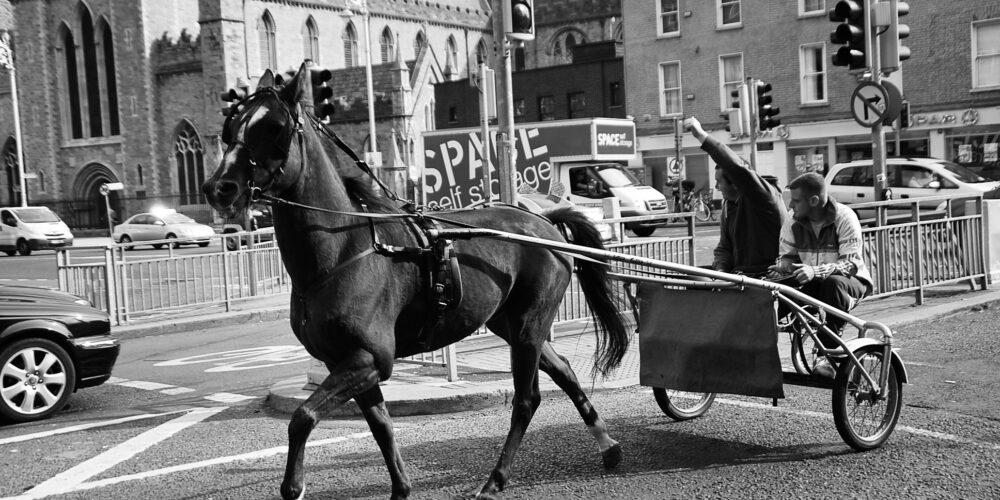Part 1
In March 2017 the Government recognised Irish Travellers as an ethnic minority. This was the culmination of a long campaign by Traveller activists, and while it was a vast improvement on the attitude behind the Report of the Commission on Itinerancy (1963),[1] which saw them as “deviant, destitute drop-outs from Irish society,”[2] it did not lead to the enactment of any positive rights.
Travellers remain one of the most discriminated-against groups in Irish society, with lower life expectancy, lower educational attainment and higher unemployment than society in general.[3]
Fewer than 31,000 people identified as Travellers in the census, though it is believed that the actual number is higher and that many choose to conceal their heritage because of discrimination. A survey on attitudes towards Travellers found that 79 per cent of respondents “would be reluctant to buy a house next door to a Traveller.”[4] In the presidential election in 2018 Peter Casey, who made anti-Traveller comments, came second, with 23 per cent of the vote. Anti-Traveller discrimination has rightly been called “the last acceptable form of racism.”[5]
Travellers have existed as a separate, nomadic group for centuries in Ireland, where they played a distinct if marginal role in the rural economy. In an era before supermarkets they peddled goods to isolated homes, were horse traders, helped with the harvest, and repaired farm and domestic utensils. From the late 1950s, as the economy “modernised”—i.e. opened up to American and European imperialism—agriculture became increasingly mechanised, plastic replaced metal utensils, and supermarkets captured the market for the goods the Travellers peddled. Their skills and trades had become obsolete.
By the 1960s, Travellers had become economically and socially displaced from rural society. Legislation prohibiting the erection of temporary dwellings has all but outlawed nomadism.
Unable to survive in rural Ireland, Travellers moved to the outskirts of towns and cities. Once this happened “they became a political problem.”[6] The Commission on Itinerancy recommended that Travellers be assimilated. A number of groups wrote to the commission suggesting that Traveller children be taken from their parents and raised as settled children, thus “solving the problem in a generation.” The report identified the education process as offering the best road to assimilation.
Travellers have their own culture, in which their nomadic way of life was central. Even though most Travellers are now sedentary, the desire to travel at will “remains the singular core pillar in terms of Traveller identity.”[6] They have their own language, called Cant, Gammon, or Shelta. While it is no longer widely spoken, most Travellers feel it is an important aspect of their identity.[7]
They had a family-based economy, with their own flexible work patterns. But under pressure from capitalism, Travellers were forced to abandon their way of life for the “dubious pleasures of public housing, full time school attendance, [and] subsistence on welfare benefits.”[8] They have found it very difficult to obtain employment or public housing, and successful school outcomes have remained elusive.
References
- Report of the Commission on Itinerancy (Dublin: Stationery Office, 1963).
- Anne Boyle, Marie Flynn, and Joan Hanafin, “From absorption to inclusion: The evolution of Irish state policy on Travellers,” in Éidín Ní Shé, Lorelle Burton, and Patrick Danaher (eds.), Social Capital and Enterprise in the Modern State (Basingstoke: Palgrave Macmillan, 2018).
- Census of Population, 2016, Profile 8: Irish Travellers.
- ibid.
- The Last Acceptable Form of Racism? (London: Traveller Movement, 2017).
- Ronnie Moore, “‘Last among equals’: Irish Travellers and change in the 21st century,” Europäisches Journal für Minderheitenfragen, vol. 5 (2012).
- Maria Reider, “Irish Travellers’ views on Cant: What folk criteria of languageness tell us about the community,” Language Awareness, vol. 27 (2018).
- Aoife Bhreatnach, Becoming Conspicuous: Irish Travellers, Society and the State, 1922–70 (Dublin: UCD Press, 2006).
■ To be continued.






